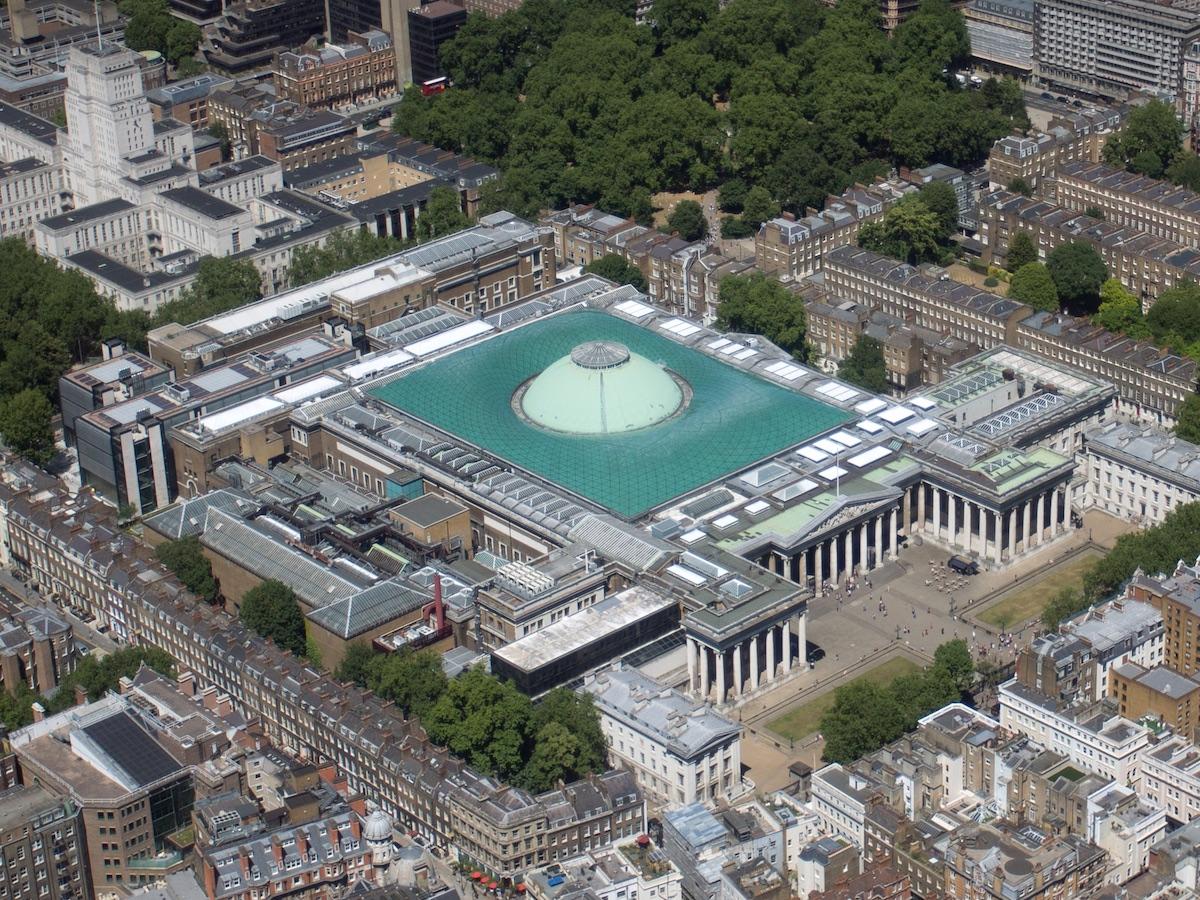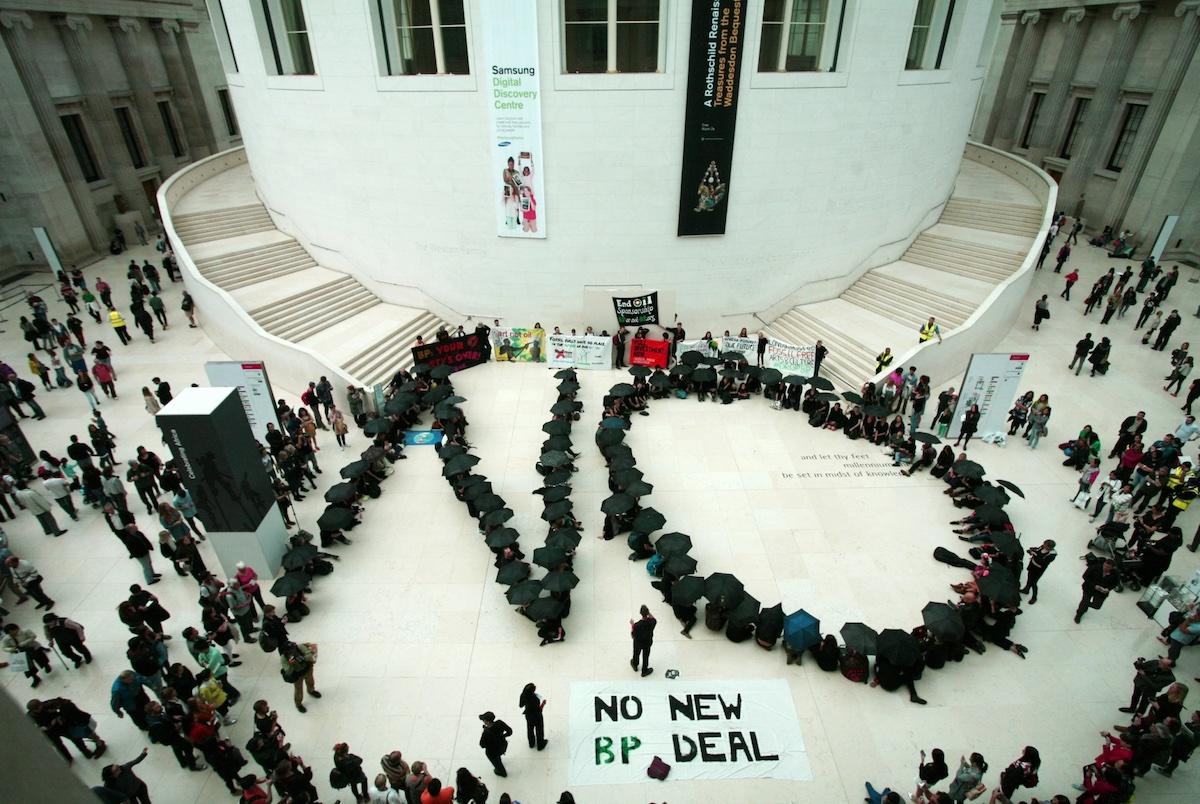
Aerial shot of the British Museum, London.
With news of the oil and gas company BP beating predicted revenue streams this year with over $5 billion in the first three months of this year, it is hard to believe that such a move comes at a time when Americans and Europeans alike find themselves facing the highest energy bills they’ve ever seen and the climate crisis rising. While BP continues to dominate the market, they also have diminished their climate efforts in recent years which has come under attack by environmental protestors and campaigners in England.
It seems that public art institutions feel the same way about protecting the environment because just last Friday, The Guardian reported that the British Museum seems to be ending their BP sponsorship deal after 27 years. The Museum’s current partnership with BP was part of a five-year contract that expired in Februrary. The museum has yet to comment definitively on the matter, except to say that the museum will have no further exhibitions or activities sponsored by BP. But according to attorneys on behalf of the climate activist group Culture Unstained, the partnership and its “supporter benefits” will continue until the end of this year, with no further explanation of what these benefits entail.
It seems as though the museum is working to gracefully manage the end of such a long partnership. In a comment to the The Guardian, the museum only repeated a previous statement: “BP is a valued long term supporter of the museum, and our current partnership runs until this year.” But in previous years, the museum has hinted toward ending the BP partnership such as when George Osborne, the Museum’s chair, said in a statement last November that he wanted to the museum to become a net zero institution (a balancing of greenhouse gases), announcing a “complete reimagination” of the institution.
The British Museum follows in the footsteps of the Tate, National Portrait Gallery, Royal Shakespeare Company, Scottish Ballet, and Royal Opera House, all who have also ended their partnerships with the fossil fuel giant in the past few years over controversies on their environmental impact.

13/09/2015. British Museum, London. Art Not Oil, a coalition of various artist, acting and music organisation, staged multiple protests in the Great Hall and exhibition rooms of the British Museum, whilst protest also took place in the Tate Modern. The coalition is protesting against corporate oil sponsorship of the arts in Britain and includes Liberate Tate, BP Out of Opera, Shell Out Sounds.
BP has annually funded the British Museum since 1996. Many of the exhibitions that BP has funded were about ancient kingdoms: the 2019 exhibition on Troy, a 2018 exhibition on Ashurbanipal of Assyria, and a 2017 exhibition on ancient Siberian warriors, among others. BP also funded lectures, events and activities, all run in the BP Lecture Theatre.
But this partnership has been a major point of contention for the public and protestors alike. Many believe that a museum should partner only with companies and corporations who have similar interests and beliefs as the museum and its mission. The ethics of museum sponsorship of course collides with financially viable interests of the museum. This is where the Museums Association comes into the conversation, with its Code of Ethics that defines the ethical standards for all cultural institutions in the UK. In the third principle, “Individual & institutional integrity” it states that museums should carefully consider offers of financial support from commercial organizations, and should “seek support from organizations whose ethical values are consistent with those of the museum.”

British Museum's BP Lecture Hall
The partnership between oil business and art museum reached a climax in October 2022, when the Museum opened a BP-sponsored exhibition on Ancient Egypt. The climate activist group, Culture Unstained called on the museum to speak out on human rights, and submitted a letter signed by eighty major figures in England to the trustees of the museum saying, “[We] urge you not just to look to Egypt’s past but to take a stand in support of human rights in Egypt today.” It also highlighted the environmental impacts of BP’s actions, and how “allowing the company to sponsor this exhibition, the Museum is actively assisting BP in projecting a misleading picture of its business.” Culture Unstained’s website has a host of information on how the Museum’s partnership with BP conflicts with the museum’s mission and reveals how the sponsored exhibitions are problematic, given the history of BP’s involvement in the areas of the world that are highlighted in the exhibitions.
While we await official word from the British Museum, protestors of the partnership are calling this development a victory. This move from the Museum makes it clear that they are serious about the climate crisis, and hopefully we can expect some more environmentally conscious exhibitions, carbon cutting measures taken, and taking down BP’s name from their site.

























